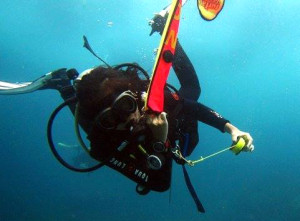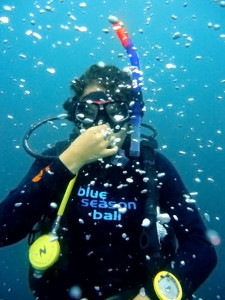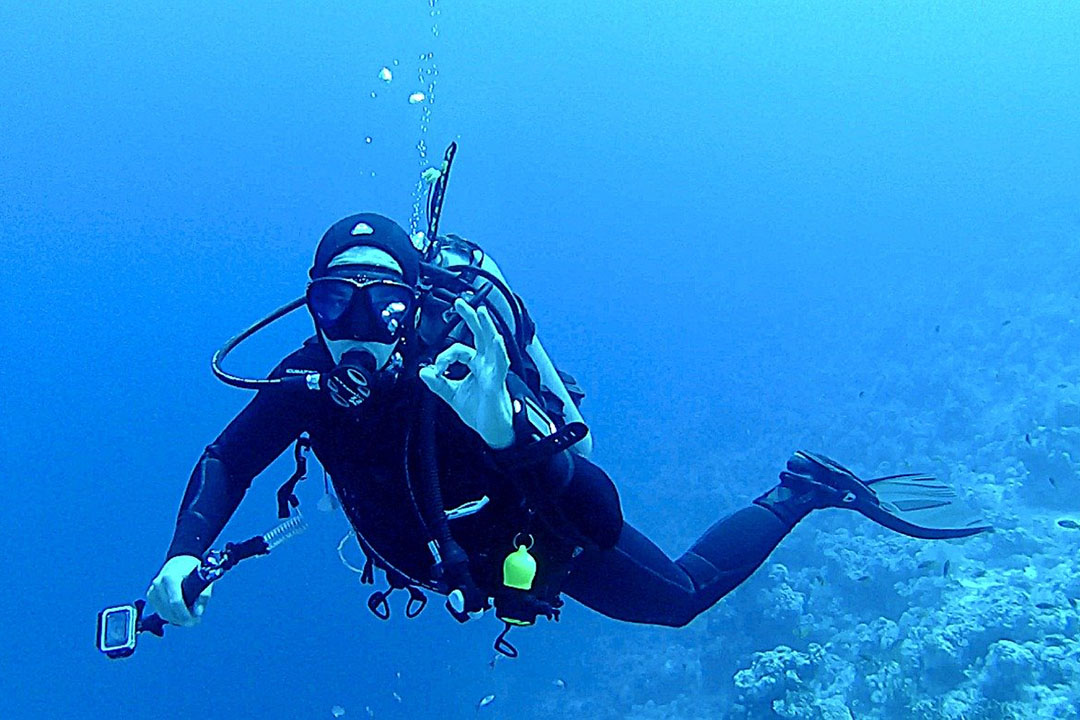For some people, fear of deep water is not an easy topic to address. That’s because fear is personal (and private). We understand that each client is unique, and everyone has their own fears and concerns when trying out diving for the first time.
Fear and anxiety are natural aspects of being human. There is no shame in having fear, as it has helped us survive and thrive in a world full of risks and uncertainties.
However, fear can sometimes be debilitating. It could limit ourselves from growth and development. If you’re reading this, you’re already taking bold steps towards overcoming your fear.
Conquering fear starts with learning how to change your mindset about the object of the particular fear. Let’s get started with this short guide.
Fighting fear starts with managing expectations
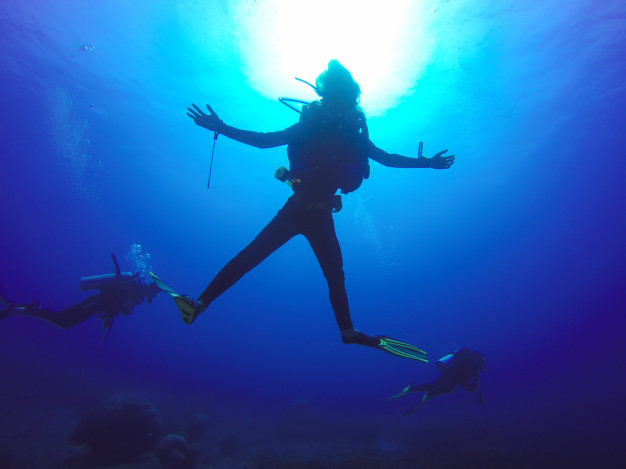
Managing your expectations is a simple yet powerful exercise to overcoming challenging situations.
In fact, we do this every day to avoid partaking in risky behaviours. It’s a safeguard against possible pain. However, be aware that expectations are not always based on truth, but rather a version (or a limited part) of the truth from prior experiences.
Fear of deep water is a result of these hard expectations that can manifest in the following thoughts:
- If my feet don’t touch the bottom of the pool/sea, I won’t be able to maintain my head above the water, and as a consequence, I’ll drown.
- If I float in the water with a buoy or life vest, the currents can take me away.
- If I suddenly let go of the buoy, I’ll sink instantly.
- I might get muscle cramps and not be able to swim properly and drown.
As a responsible scuba diving agency, we’re not denying the possibility that these could happen. But we see them as worst-case scenarios that can happen only when we don’t train and prepare our divers properly.
Diving can indeed be risky, much like any other activities e.g. driving, travelling, or flying. The things that mitigate unnecessary risks when doing these activities are knowledge, preparation, and confidence.
What are the more useful expectations about deep water?
- Swimming in deep water is safe if you are in trusted company, such as your dive instructor and dive buddies. A dive instructor’s job is to keep everyone safe and ensure that everyone in the dive session enjoys themselves and experiences the beautiful underwater world.
- Every problem has a solution. Diving science and technology has been evolving for many decades. Designs of equipment have changed so much since the very first divers were around.
Thousands of divers around the world have discovered new solutions and contributed to the vast collective knowledge about diving. (Check out: What to do if you run out of air while scuba diving)
- Humans float in the sea! The sea is denser than the training swimming pool because of its salinity. This means you will float effortlessly provided that you don’t struggle so much in the water.
- Redundancy is a strong culture in diving. All standard diving equipment comes with two regulators in case one of them breaks. If you dive with one buddy (and you should), both of you will have two spares in total. The probability for all four regulators to malfunction is very small! Now imagine diving with two buddies, three buddies, four buddies…
- Oceanic forces can be countered using fins and picking the right dive sites. The most popular dive sites rarely have strong currents. The fins are great assets as they help you swim against currents if you need to. (Check out: How to behave in a strong current)
- Sea creatures are not a threat. Your dive instructor will tell you about what to expect when encountering various sea animals, and what you should and shouldn’t do around them. (Check out: Code of Conduct – Diving With Mola Mola).
- You can communicate underwater. Your dive instructor will teach you the various easy-to-learn hand signals to use when underwater.
When you learn something new, visualize yourself applying that knowledge
Visualization is probably unique to humans. It lets us take a ‘sneak peek’ of the future experience to be had.
The most positive visualization (strongly based on reality) is this:
You are in the water, your dive instructor and close friends are watching over you in case you feel comfortable and need help. You trust the buoy and your life vest to keep you afloat – not that you need it since you have your snorkel and dive gear to provide air for you.
Once you’ve learned to breathe underwater, visualize yourself taking in some fresh air and blowing bubbles in the water. Picture yourself doing an underwater meditation, breathing through the mouthpiece slowly and gently.
You may find it hard to visualize the scenes right now because you haven’t experienced the training yet.
Are you ready to learn diving?
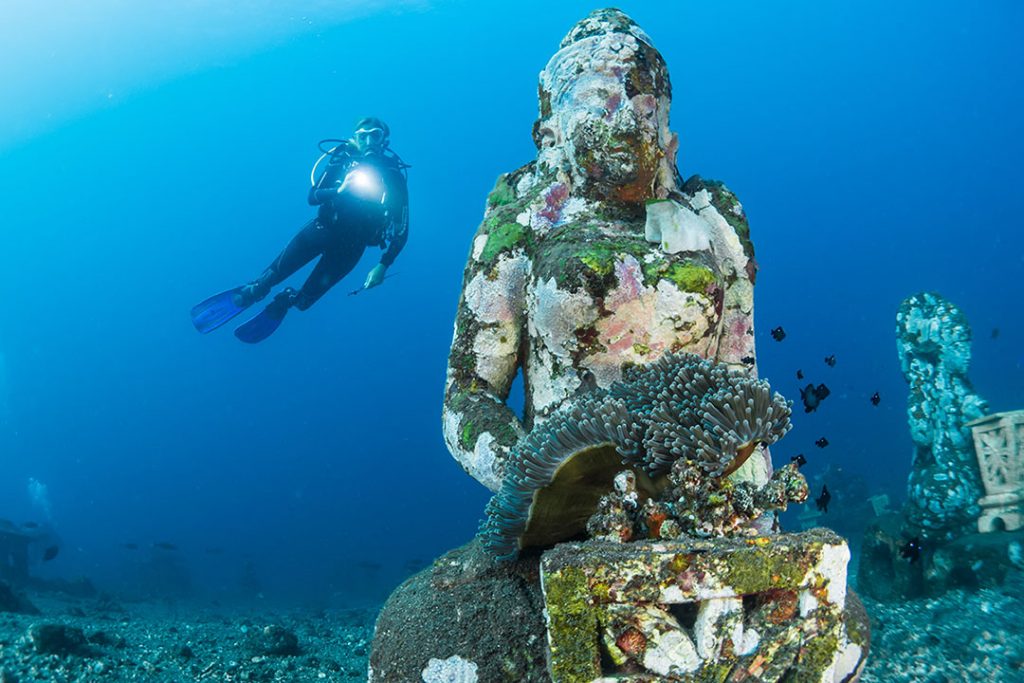
If you want to have a go at scuba diving, you don’t need to invest four days of your time to become a PADI Certified Diver after taking the Open Water course. You can opt for the PADI Discover Scuba Diving course, which is a one-day course that allows you to have a feel of what diving is like. The certified PADI IDC instructors at Blue Season Bali are ready to guide you on your underwater journey. We have a dedicated team that knows the ins and outs of scuba diving for all levels of individuals. Rest assured we’ll make sure your diving adventure is in good hands! Reach out to us at Blue Season Bali!

